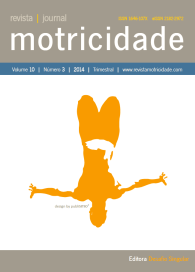Motivational climate, behaviour regulation and perceived effort in soccer athletes
DOI:
https://doi.org/10.6063/motricidade.3453Abstract
The purpose of this study was to test the integration of two motivational theoretical models (self-determination theory and the achievement goal theory) to analyze the impact of motivational climate in the regulation of motivation and athletes´ effort perception. Participated in the study 460 athletes (male football players at both regional and national level, on the categories of beginners, youth, juniors and seniors, with 17.42 ± 4.37 years-old). The quality of the structural equation model was examined by the Chi-square value and some complementary model fit indices. The results support the model fit (S-Bχ²= 288.84, df= 147, p< 0.001, S-Bχ²/df= 1.96, SRMR= 0.049, NNFI= 0.912, CFI= 0.924, RMSEA= 0.046, 90%IC RMSEA= 0.038−0.054), suggesting that a motivational task-oriented climate has a significant positive effect on autonomous motivation, which in turn has a significant positive effect on athletes' effort perception. On the other hand, an ego-oriented environment had a positive effect on the controlled motivation, which in turn had a negative effect on athletes' effort perception, although not significant.
Downloads
Published
Issue
Section
License
The authors of submitted manuscripts must transfer the full copyright to Journal Motricidade / Desafio Singular Editions. Granting copyright permission allows the publication and dissemination of the article in printed or electronic formats and copyrights start at the moment the manuscript is accepted for publication. It also allows Journal Motricidade to use and commercialize the article in terms of licensing, lending or selling its content to indexation/abstracts databases and other entities.
According to the terms of the Creative Commons licence, authors may reproduce a reasonable number of copies for personal or professional purpose but without any economic gains. SHERPA/RoMEO allows authors to post a final digital copy (post-printing version) of the article in their websites or on their institutions' scientific repository.


